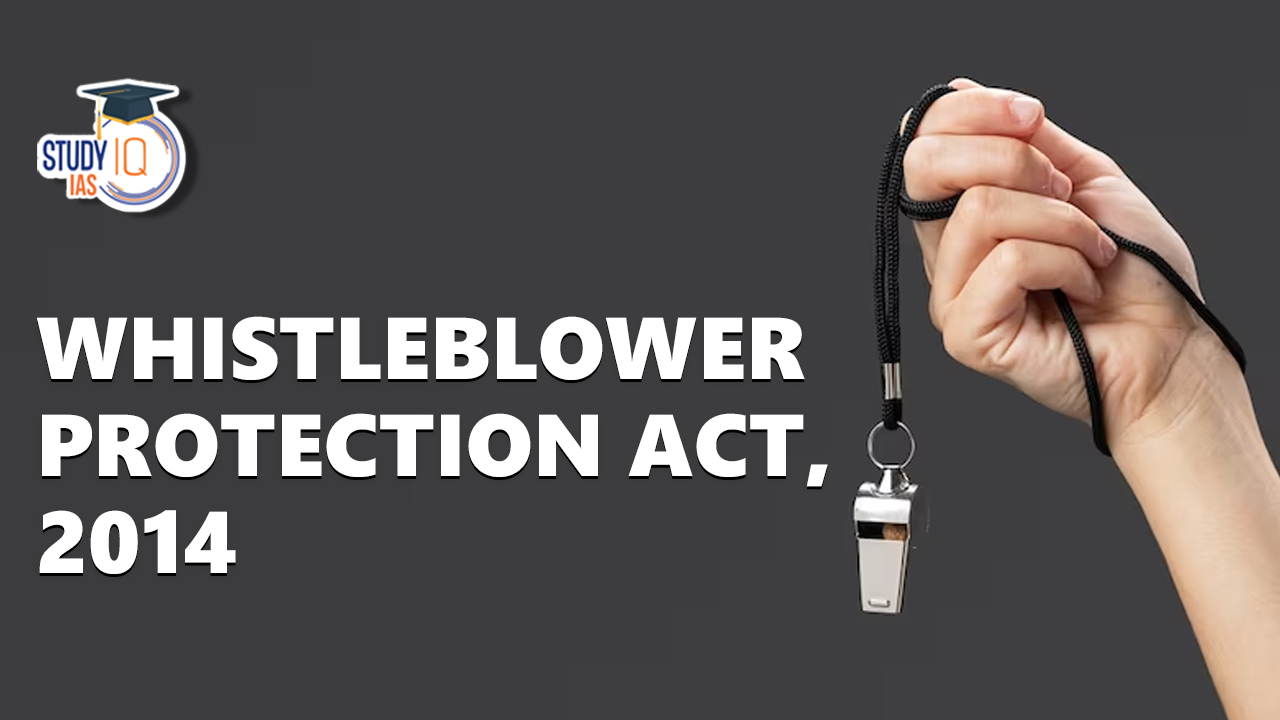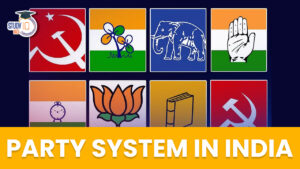Table of Contents
The term “whistle-blowing” dates back to the 19th century, originally referring to anyone who blew a whistle, including sports referees. In a corporate context, whistle-blowing means reporting issues in the public interest. It involves exposing illegal, unethical, or immoral activities within an organization. The goal of whistle-blowing is to quickly address problems, prevent employees from misusing internal controls, and demonstrate that the organization values ethical behavior. Whistle-blowers can be employees, customers, contractors, or anyone with knowledge of misconduct.
Whistleblower Protection Act, 2014
Whistleblowing is the act of exposing illegal or unethical behaviour within an organization. Recognizing the importance of protecting whistleblowers to combat corruption, the Law Commission of India recommended the implementation of a whistleblower protection law. Any person (i.e., a whistleblower) is able to disclose a public servant’s act of corruption, deliberate misuse of authority or discretion, or unlawful conduct under the Whistleblower Protection Act 2014 (WPA).
Who are Whistleblowers?
Whistleblowers are individuals who come forward to disclose information about illegal, unethical, or wrongful activities within an organization. They are typically insiders who have firsthand knowledge or evidence of wrongdoing, such as fraud, corruption, safety violations, or other forms of misconduct. Whistleblowers can be employees, former employees, contractors, or even external stakeholders who witness or uncover these activities.
By speaking out, whistleblowers aim to expose the truth, promote transparency, and prevent harm to the public interest. Their actions often involve significant personal risk, as they may face retaliation or adverse consequences for bringing misconduct to light. Whistleblower Protection Act 2014 was basically an effort in the direction of offering them protection.
Read about: Panchayati Raj
The Whistle Blower Protection Act 2011
The Whistle Blower Protection Act, 2011, is an important law designed to protect individuals who report wrongdoing, corruption, or illegal activities in the public sector. It emphasizes the crucial role of whistleblowers in promoting transparency and accountability. Provisions and Objectives:
Protection from Retaliation:
The Act protects whistleblowers from negative actions like job loss, harassment, or demotion for making disclosures.
Confidentiality:
It ensures that whistleblowers’ identities are kept secret to encourage reporting without fear. They can report issues anonymously or confidentially.
Investigation and Action:
The Central Vigilance Commission (CVC) is responsible for investigating complaints and can recommend actions against wrongdoers.
Rewards for Whistleblowers:
In some cases, whistleblowers may receive rewards for providing valuable information that helps recover lost funds or prevent financial loss to the government.
Public Awareness:
The Act aims to raise awareness about the importance of whistleblowing and promote a culture of integrity in the public sector.
Challenges and Implementation:
While the Act is a positive step, its effectiveness can be hindered. Some whistleblowers still face retaliation despite legal protections. To succeed, it is essential to strengthen the systems in place, ensure prompt investigations, and provide adequate support for whistleblowers.
Whistleblower Protection Act, 2014 Background
In 2004, the Supreme Court directed the Central government to establish an interim administrative mechanism to address whistleblower complaints until a law was enacted. As a result, the Public Interest Disclosure and Protection of Informers Resolution (PIDPIR) was introduced in 2004, empowering the Central Vigilance Commission (CVC) to take action on such complaints.
In 2007, the Second Administrative Reforms Commission reiterated the need for a specific law to safeguard whistleblowers. India’s commitment to international conventions was evident through its signing of the UN Convention against Corruption in 2005. This convention stressed the importance of facilitating corruption reporting and providing protection to those who come forward.
In line with these obligations, the Whistleblowers Protection Bill was proposed in 2011 and eventually enacted as law in 2014. To reinforce the importance of addressing whistleblower concerns, the Companies Act, 2013, and Securities and Exchange Board of India regulations made it mandatory for companies to have mechanisms in place to handle whistleblower complaints.
Read about: Directive Principles of State Policy
Whistleblower Protection Act Salient Features
The Whistleblower Protection Act 2014 encompasses various provisions to safeguard whistleblowers and promote transparency and accountability. The key provisions of the Act can be summarized as follows:
- Mechanism to Receive Complaints: The Act establishes a mechanism to receive complaints related to corruption or misuse of power by public servants.
- Safeguards Against Victimization: The Act provides adequate safeguards to protect whistleblowers from victimization or retaliation for making disclosures.
- Competent Authorities: The Act defines various competent authorities to whom public interest disclosures can be made, with each authority assigned specific responsibilities based on the nature of the complaint. For instance, the Prime Minister acts as the competent authority for complaints against Union Ministers.
- Identity Disclosure and Time Period: The Act requires complainants to establish their identity, and anonymous complaints are not permitted. Complaints can be made within a maximum time period of seven years.
- Exemptions and Appeals: Certain personnel, such as those belonging to the Special Protection Group, are exempted from the Act. Additionally, any person aggrieved by an order of the Competent Authority can appeal to the respective High Court within sixty days.
- Penalties for Identity Disclosure: Revealing the identity of a complainant can lead to imprisonment for up to three years and a fine of up to Rs 50,000. Knowingly disclosing false or misleading information may result in imprisonment for up to two years and a fine of up to Rs 30,000.
- Annual Report: The Competent Authority is required to prepare an annual report detailing its activities and submit it to the Central or State Government, which is then presented before the respective Parliament or State Legislature.
- Overriding Effect: The Whistleblower Protection Act overrides the Official Secrets Act, of 1923, allowing for disclosures that do not harm the sovereignty of the nation.
Read about: Indian Constitution
Important Reports Related to Whistleblowers
The Law Commission of India recognized the importance of whistleblower protection in 2001. They recommended the formulation of a law to address this issue, highlighting the significance of safeguarding individuals who disclose crucial information about wrongdoing.
The Hota Committee, also known as the Committee on Public Service Reforms, discussed the protection of civil officials who come forward with sensitive information regarding abuses of power and authority. Although specific recommendations were not provided, the committee acknowledged the need to address whistleblower protection.
In response to the plea made by Satyendra Dubey (Government of India Officer in National Highway Authority of India), the government took action by introducing the ‘Public Interest Disclosure and Protection of Informers Resolution (PIDPIR)’ in 2004. This resolution empowered the Central Vigilance Commission (CVC) to take necessary actions on complaints received from whistleblowers.
The Second Administrative Reforms Commission, in its report published in 2007, emphasized the significance of enacting a dedicated law to protect whistleblowers. This report further reinforced the importance of providing legal safeguards and support to individuals who expose corruption and misconduct.
Pros of Whistle-Blowing
- Anti-Corruption Tool: Whistle-blowing helps expose corruption and unethical practices, promoting a healthier work environment.
- Improved Governance: It encourages good corporate governance and risk management by ensuring effective internal controls.
- Public Interest Protection: Whistle-blowers reveal crucial information that can prevent harm to the public, leading to investigations and corrective actions.
- Accountability and Transparency: They hold organizations accountable, fostering a culture of integrity and discouraging future misconduct.
- Policy Improvements: Whistle-blowing can lead to better policies and reforms by highlighting systemic issues that need attention.
- Protection for Whistle-Blowers: Many countries have laws to protect whistle-blowers from retaliation, ensuring their safety and confidentiality.
Cons of Whistle-Blowing
- Retaliation Risks: Whistle-blowers may face harassment, job loss, or social isolation, which can discourage them from coming forward.
- Loss of Privacy: Disclosing sensitive information can compromise privacy and lead to reputational damage.
- Emotional Toll: The process can cause anxiety, depression, and feelings of isolation due to backlash and criticism.
- Limited Impact: Sometimes, whistle-blowing may not result in immediate change, as organizations may resist reform or investigations can be slow.
- Potential Misuse: Whistle-blowing can be misused for personal gain, leading to false allegations, so it’s important to handle reports ethically.
Balancing the benefits and risks of whistle-blowing requires careful consideration. While whistle-blowers are essential for revealing wrongdoing, it is crucial to protect their rights and provide support to encourage responsible reporting. This helps maintain transparency and public trust in institutions.
Challenges Faced by Whistleblowers
Despite the existence of the Whistleblower Protection Act of 2014, several concerns remain for whistleblowers. Some of the key issues include:
Inadequate Awareness and Implementation
Many whistleblowers are still unaware of their rights and the protections afforded to them under the law. There is a lack of effective dissemination of information about whistleblower protection, leading to underutilization of the legal framework.
Retaliation and Lack of Protection
Whistleblowers continue to face retaliation and victimization despite legal safeguards. Instances of harassment, termination, blacklisting, and professional damage are still prevalent, creating a chilling effect on potential whistleblowers.
Inefficiency in Legal Processes
The legal processes for whistleblower cases can be complex, time-consuming, and expensive. Whistleblowers often face challenges in accessing justice and may encounter delays, legal hurdles, and the burden of proving their claims.
Limited Support Mechanisms
Whistleblowers may lack adequate support systems, including financial assistance, counselling services, and protection from personal and professional repercussions. The absence of comprehensive support mechanisms can discourage individuals from coming forward.
Lack of Anonymity and Confidentiality
Whistleblowers may be concerned about maintaining their anonymity and the confidentiality of their identity and information. The fear of exposure can deter potential whistleblowers, especially in cases where the wrongdoers hold influential positions.
Insufficient Whistleblower Rewards
The current legislation does not provide significant incentives or financial rewards for whistleblowers who expose wrongdoing. This limitation may deter individuals from taking the risk of reporting misconduct, especially in cases involving powerful entities.
Addressing these concerns requires continuous efforts to enhance awareness, strengthen protection mechanisms, streamline legal procedures, and establish robust support systems for whistleblowers. Additionally, regular monitoring and evaluation of the implementation of whistleblower protection laws are necessary to ensure their effectiveness.
Read about: Uniform Civil Code
Whistleblower Protection Act 2014 UPSC
The Whistleblower Protection Act of 2014 is a significant topic for the UPSC exam as it aligns with the syllabus of governance, transparency, and accountability. It covers concepts related to ethics, corruption, and public administration. Understanding the provisions of this act is crucial for aspirants to comprehend the mechanisms in place for protecting whistleblowers and promoting transparency in governance. Knowledge of this topic is essential for UPSC preparation, and it can be explored through UPSC Online Coaching and incorporated into practice through UPSC Mock Test to enhance understanding and application of the subject matter in the context of the civil services examination.
Read about: Pressure Group


 Maharashtra Bill to Curb Urban Naxalism,...
Maharashtra Bill to Curb Urban Naxalism,...
 Party System in India, Feature, Importan...
Party System in India, Feature, Importan...
 Consolidated Fund of India, Meaning and ...
Consolidated Fund of India, Meaning and ...





















